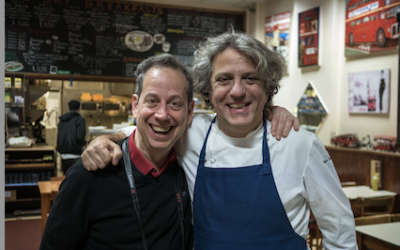 Is it a waste of your time to go to a fine restaurant for homestyle food made the same way for generations? Is it a waste of an acclaimed chef’s time to cook it?
Is it a waste of your time to go to a fine restaurant for homestyle food made the same way for generations? Is it a waste of an acclaimed chef’s time to cook it?
If you ask chef Massimo Bottura of Osteria Francescana, just named world’s fifth best restaurant at this year’s World’s Best Awards, the answer is no. Indeed, Bottura goes so far as to suggest Italian grandmothers don’t do Italian grandmother’s food justice.
“Tradition does not respect ingredients,” Bottura explained to me.
My first reaction to Bottura’s heretical statement was one of relief: Relief that he and I were chatting on the breakfast terrace at Vila Joya, a secluded boutique resort in the Algarve, and not at a bustling coffee bar in his native Modena. I’d have feared for our personal safety had his sacrilegious words been overhead anywhere in Italy. Bottura was taking on tradition in our private conversation as he would more dramatically a few hours later with his closing-night tasting dinner at this year’s Portugal International Gourmet Festival.
 Don’t panic: Italy’s highest-rated chef and recent recipient of a third Michelin star has not forgotten his roots. The artisan producers and farmers of the Emilia-Romagna region have no greater champion. Ask him what Parmigiano-Reggiano he uses and he’ll talk about the 24, 36, 40 and 50-month old cheeses from Hombre single-owner organic dairy with such affection you half expect him to describe the sleeping patterns of each of the dairy’s Modena White Cows.
Don’t panic: Italy’s highest-rated chef and recent recipient of a third Michelin star has not forgotten his roots. The artisan producers and farmers of the Emilia-Romagna region have no greater champion. Ask him what Parmigiano-Reggiano he uses and he’ll talk about the 24, 36, 40 and 50-month old cheeses from Hombre single-owner organic dairy with such affection you half expect him to describe the sleeping patterns of each of the dairy’s Modena White Cows.
Bottura is not rejecting his heritage so much as answering his critics who expect their regional Italian food to be rustic, homey and maternal. He tells me he even finds himself confronting his own mother, who swears her tagliatelle are better than his.
A modernist and kitchen chemist spiritually aligned with Ferran Adrià and Heston Blumenthal Bottura has always kept a clear eye – but never a nostalgic one – on the past. Now he’s put a second one there. “This period of economic crisis is no time for fireworks and magic tricks”, he explains. “It’s time for real things”.
In a style of cooking I call “nouveau retro” Bottura revisits regional and national classics with world-class techniques and ingredients. He insists the grandmother who, according to tradition, dutifully boils her bollito misto – Northern Italy’s legendary “mixed boil” – is killing off the vitamins and decimating the organoleptic flavour compounds in the meat and vegetables. Can’t argue there: I suspect the average Italian nonna is rubbish at getting her head around organoleptic compounds. His radical response was imagined a long way from home (it’s safer there), on a visit to New York. Lying on the ground at Central Park and staring up at the Manhattan skyline he had a vision for what would become a new signature dish: “Bollito misto not boiled”, a reinvention of a classic gently cooked at 65 degrees (150 degrees Fahrenheit), its vitamins and aromas left intact.
The progression of Bottura’s cooking philosophy is purposefully represented in the autobiographical mouthful, “Compression of my Gastronomic Life in the Shape of Pasta and Bean”. On his menu at Osteria Francescana he lists the dish, ironically or not, it’s hard to say, as a classic. In Portugal he served this three-layered creation in small glasses. At the base was a crème royale of foie gras representing his French culinary training with Georges Coigny and Alain Ducasse; at the top, an air of rosemary in homage to Adrià. The core had Parmigiano-Reggiano crusts standing in for maltagliati (“badly cut”) pasta in a pig-skin-enriched pasta e fagioli (“pasta and beans”), the hearty bean stew emitting call-to-home fragrances from every other open kitchen window in Italy.
“I’ve compressed my grandmother”, Bottura told me rather proudly as he illustrated the dish in my memo pad.
[slider_pro id=”13″]
The pasta e fagioli I tried that night in Portugal was unquestionably the best I have ever had – or might ever have. Still, something other than pasta was missing. The soul maybe? The thrill of discovery felt by a student on his first trip to Italy? To explain my thinking I reminded Bottura of the utter joy felt by the boy in Vittorio De Sica’s film “The Bicycle Thief” when treated to a slice of pizza by his destitute father. Bottura nodded and smiled. Surely he couldn’t match the emotion of that pizza with kitchen wizardry alone. Or could he?
Bottura closed the dinner – and the festival – by turning what he regards as the world’s most snobby food, foie gras, into an ice cream lolly dipped in hazelnuts. He injected the lollies with aged Villa Manodori Balsamic vinegar. Bottura himself produces this vinegar in very small quantities matured in oak, chestnut and juniper barrels.
 When I told Bottura I loved his foie gras ice cream-on-a-stick he seemed pleased enough. But when I added a single detail, that the Villa Manodori had dripped down like syrup onto my hands, compelling me to lick the prized 40-year-old Balsamic off my fingers, the three-star chef looked happy: Happy as a young boy from Modena in his grandmother’s kitchen.
When I told Bottura I loved his foie gras ice cream-on-a-stick he seemed pleased enough. But when I added a single detail, that the Villa Manodori had dripped down like syrup onto my hands, compelling me to lick the prized 40-year-old Balsamic off my fingers, the three-star chef looked happy: Happy as a young boy from Modena in his grandmother’s kitchen.



0 Comments